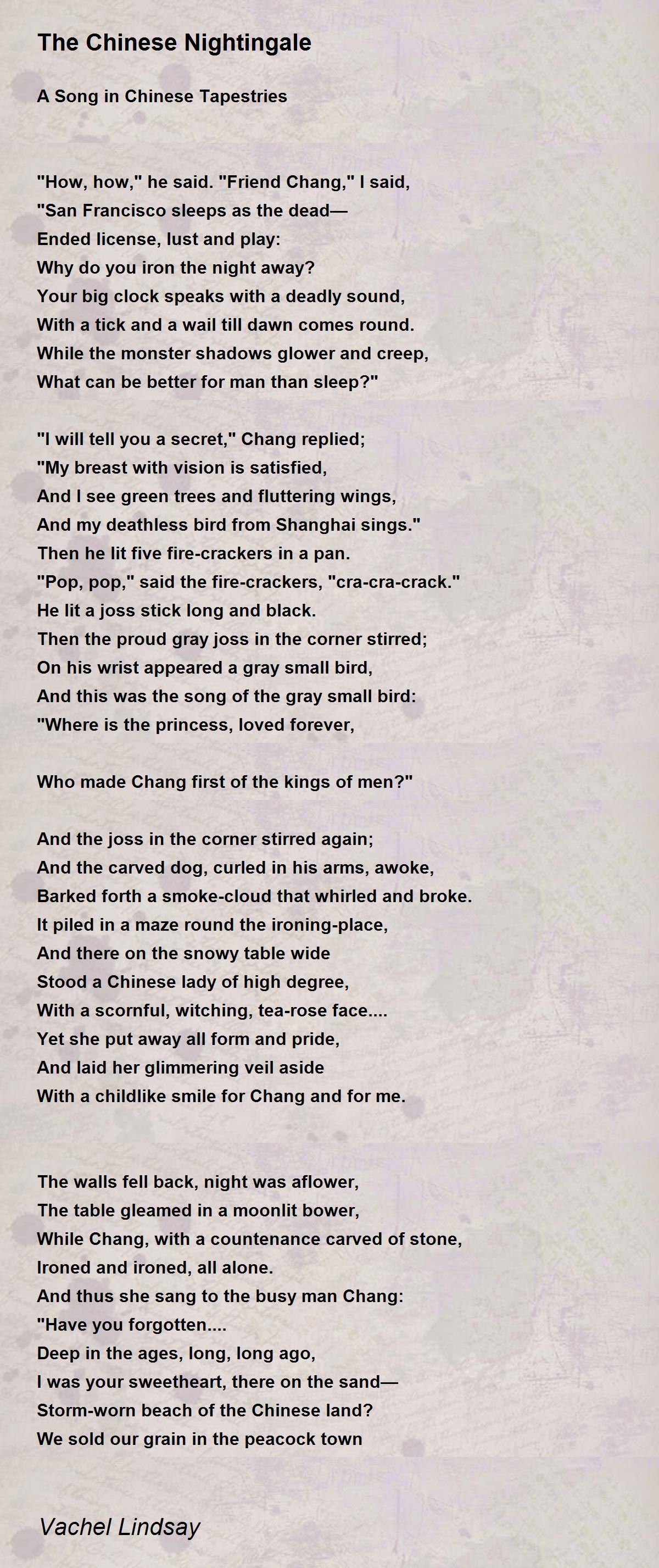Isn´t there a ring of Can Xue here?
The Chinese Nightingale
Vachel Lindsay
A Song in Chinese Tapestries
"How, how," he said. "Friend Chang," I said,
"San Francisco sleeps as the dead—
Ended license, lust and play:
Why do you iron the night away?
Your big clock speaks with a deadly sound,
With a tick and a wail till dawn comes round.
While the monster shadows glower and creep,
What can be better for man than sleep?"
"I will tell you a secret," Chang replied;
"My breast with vision is satisfied,
And I see green trees and fluttering wings,
And my deathless bird from Shanghai sings."
Then he lit five fire-crackers in a pan.
"Pop, pop," said the fire-crackers, "cra-cra-crack."
He lit a joss stick long and black.
Then the proud gray joss in the corner stirred;
On his wrist appeared a gray small bird,
And this was the song of the gray small bird:
"Where is the princess, loved forever,
Who made Chang first of the kings of men?"
And the joss in the corner stirred again;
And the carved dog, curled in his arms, awoke,
Barked forth a smoke-cloud that whirled and broke.
It piled in a maze round the ironing-place,
And there on the snowy table wide
Stood a Chinese lady of high degree,
With a scornful, witching, tea-rose face....
Yet she put away all form and pride,
And laid her glimmering veil aside
With a childlike smile for Chang and for me.
The walls fell back, night was aflower,
The table gleamed in a moonlit bower,
While Chang, with a countenance carved of stone,
Ironed and ironed, all alone.
And thus she sang to the busy man Chang:
"Have you forgotten....
Deep in the ages, long, long ago,
I was your sweetheart, there on the sand—
Storm-worn beach of the Chinese land?
We sold our grain in the peacock town
Built on the edge of the sea-sands brown—
Built on the edge of the sea-sands brown....
"When all the world was drinking blood
From the skulls of men and bulls
And all the world had swords and clubs of stone,
We drank our tea in China beneath the sacred spice-trees,
And heard the curled waves of the harbor moan.
And this gray bird, in Love's first spring,
With a bright-bronze breast and a bronze-brown wing,
Captured the world with his carolling.
Do you remember, ages after,
At last the world we were born to own?
You were the heir of the yellow throne—
The world was the field of the Chinese man
And we were the pride of the Sons of Han?
We copied deep books and we carved in jade,
And wove blue silks in the mulberry shade...."
"I remember, I remember
That Spring came on forever,
That Spring came on forever,"
Said the Chinese nightingale.
My heart was filled with marvel and dream,
Though I saw the western street-lamps gleam,
Though dawn was bringing the western day,
Though Chang was a laundryman ironing away....
Mingled there with the streets and alleys,
The railroad-yard and the clock-tower bright,
Demon clouds crossed ancient valleys;
Across wide lotus-ponds of light
I marked a giant firefly's flight.
And the lady, rosy-red,
Flourished her fan, her shimmering fan,
Stretched her hand toward Chang, and said:
"Do you remember,
Ages after,
Our palace of heart-red stone?
Do you remember
The little doll-faced children
With their lanterns full of moon-fire,
That came from all the empire
Honoring the throne?—
The loveliest fête and carnival
Our world had ever known?
The sages sat about us
With their heads bowed in their beards,
With proper meditation on the sight.
Confucius was not born;
We lived in those great days
Confucius later said were lived aright....
And this gray bird, on that day of spring,
With a bright bronze breast, and a bronze-brown wing,
Captured the world with his carolling.
Late at night his tune was spent.
Peasants,
Sages,
Children,
Homeward went,
And then the bronze bird sang for you and me.
We walked alone. Our hearts were high and free.
I had a silvery name, I had a silvery name,
I had a silvery name — do you remember
The name you cried beside the tumbling sea?"
Chang turned not to the lady slim—
He bent to his work, ironing away;
But she was arch, and knowing and glowing,
And the bird on his shoulder spoke for him.
"Darling . . . darling . . . darling . . . darling . . ."
Said the Chinese nightingale.
The great gray joss on a rustic shelf,
Rakish and shrewd, with his collar awry,
Sang impolitely, as though by himself,
Drowning with his bellowing the nightingale's cry:
"Back through a hundred, hundred years
Hear the waves as they climb the piers,
Hear the howl of the silver seas,
Hear the thunder.
Hear the gongs of holy China
How the waves and tunes combine
In a rhythmic clashing wonder,
Incantation old and fine:
`Dragons, dragons, Chinese dragons,
Red fire-crackers, and green fire-crackers,
And dragons, dragons, Chinese dragons.'"
Then the lady, rosy-red,
Turned to her lover Chang and said:
"Dare you forget that turquoise dawn
When we stood in our mist-hung velvet lawn,
And worked a spell this great joss taught
Till a God of the Dragons was charmed and caught?
From the flag high over our palace home
He flew to our feet in rainbow-foam —
A king of beauty and tempest and thunder
Panting to tear our sorrows asunder.
A dragon of fair adventure and wonder.
We mounted the back of that royal slave
With thoughts of desire that were noble and grave.
We swam down the shore to the dragon-mountains,
We whirled to the peaks and the fiery fountains.
To our secret ivory house we were bourne.
We looked down the wonderful wing-filled regions
Where the dragons darted in glimmering legions.
Right by my breast the nightingale sang;
The old rhymes rang in the sunlit mist
That we this hour regain —
Song-fire for the brain.
When my hands and my hair and my feet you kissed,
When you cried for your heart's new pain,
What was my name in the dragon-mist,
In the rings of rainbowed rain?"
"Sorrow and love, glory and love,"
Said the Chinese nightingale.
"Sorrow and love, glory and love,"
Said the Chinese nightingale.
And now the joss broke in with his song:
"Dying ember, bird of Chang,
Soul of Chang, do you remember? —
Ere you returned to the shining harbor
There were pirates by ten thousand
Descended on the town
In vessels mountain-high and red and brown,
Moon-ships that climbed the storms and cut the skies.
On their prows were painted terrible bright eyes.
But I was then a wizard and a scholar and a priest;
I stood upon the sand;
With lifted hand I looked upon them
And sunk their vessels with my wizard eyes,
And the stately lacquer-gate made safe again.
Deep, deep below the bay, the sea-weed and the spray,
Embalmed in amber every pirate lies,
Embalmed in amber every pirate lies."
Then this did the noble lady say:
"Bird, do you dream of our home-coming day
When you flew like a courier on before
From the dragon-peak to our palace-door,
And we drove the steed in your singing path—
The ramping dragon of laughter and wrath:
And found our city all aglow,
And knighted this joss that decked it so?
There were golden fishes in the purple river
And silver fishes and rainbow fishes.
There were golden junks in the laughing river,
And silver junks and rainbow junks:
There were golden lilies by the bay and river,
And silver lilies and tiger-lilies,
And tinkling wind-bells in the gardens of the town
By the black-lacquer gate
Where walked in state
The kind king Chang
And his sweet-heart mate....
With his flag-born dragon
And his crown of pearl...and...jade,
And his nightingale reigning in the mulberry shade,
And sailors and soldiers on the sea-sands brown,
And priests who bowed them down to your song—
By the city called Han, the peacock town,
By the city called Han, the nightingale town,
The nightingale town."
Then sang the bird, so strangely gay,
Fluttering, fluttering, ghostly and gray,
A vague, unravelling, final tune,
Like a long unwinding silk cocoon;
Sang as though for the soul of him
Who ironed away in that bower dim: —
"I have forgotten
Your dragons great,
Merry and mad and friendly and bold.
Dim is your proud lost palace-gate.
I vaguely know
There were heroes of old,
Troubles more than the heart could hold,
There were wolves in the woods
Yet lambs in the fold,
Nests in the top of the almond tree....
The evergreen tree... and the mulberry tree...
Life and hurry and joy forgotten,
Years on years I but half-remember...
Man is a torch, then ashes soon,
May and June, then dead December,
Dead December, then again June.
Who shall end my dream's confusion?
Life is a loom, weaving illusion...
I remember, I remember
There were ghostly veils and laces...
In the shadowy bowery places...
With lovers' ardent faces
Bending to one another,
Speaking each his part.
They infinitely echo
In the red cave of my heart.
`Sweetheart, sweetheart, sweetheart.'
They said to one another.
They spoke, I think, of perils past.
They spoke, I think, of peace at last.
One thing I remember:
Spring came on forever,
Spring came on forever,"
Said the Chinese nightingale.
Vachel Lindsay
Friday, January 3, 2003
Read The Chinese Nightingale poem by Vachel Lindsay written. The Chinese Nightingale poem is from Vachel Lindsay poems. The Chinese Nightingale poem summary, analysis and comments.

www.poemhunter.com



